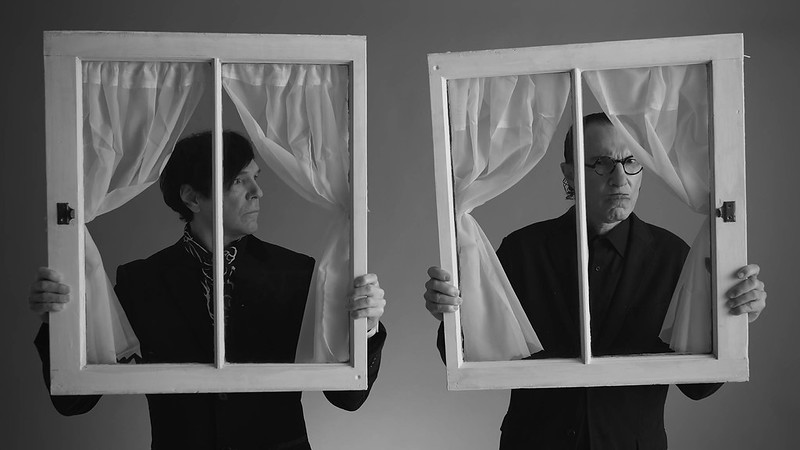
The Sparks Brothers
directed by Edgar Wright
starring Ron Mael & Russell Mael
MRC Non-Fiction
Back in May of last year, I took a distinct pleasure in briefly walking away from my usual role of critiquing foreign cinema for Ink 19 to review, at length, Sparks’ 24th studio album, A Steady Drip, Drip, Drip. For those of you who are curious about my thoughts on the record, but aren’t curious enough to click through to my review, let me write here that despite my expectations from being a fan of the brothers Mael for almost four decades, which were coupled with the desperate need at that time for anything that could bring me out of the doldrums of months of COVID captivity, A Steady Drip, Drip, Drip went far beyond what I had hoped for from a band that has repeatedly transformed themselves in an evocative and surprising manner for over half a century.
In the years since I started writing reviews of different types of art, I have developed the strict policy of taking a few extra moments to step back before assembling any review of a work by a filmmaker whom I have admired, or in the case of Sparks, albums by musicians whom I’ve adored, in fear of being unable to look at the newest effort without the overabundance of affection for the artist interfering with my objective judgement. Given this policy, I have chosen to pass on reviewing some works, but, more often than not, I trust myself to hold the fan in me at bay.
Having just watched the world premiere at Sundance of Edgar Wright’s long anticipated documentary, The Sparks Brothers, I now wonder if Wright, who admits in his film to being a massive fan of the band himself, should’ve excluded himself from the project as a director, opting instead to offer his celebrity testimonial to the Maels in some other film where he isn’t in charge of the structure.
For the predominance of his film career, Edgar Wright has proudly assumed the role of spirited fanboy who spins his beloved cinematic, musical, and graphic novel favorites to the big screen with fictional narrative interpretations to varying degrees of success, but for his first attempt at a feature-length documentary, Wright stumbles mightily with The Sparks Brothers. At first, I can only hypothesize why such a misstep occurred outside of Wright’s aforementioned affection for Sparks, but I feel that given that this project was announced almost three years ago, which lead Wright to interview almost eighty high-profile figures who would convey their own glittering thoughts on the Maels in the film, one wonders if a desire to not kill any of his babies (a filmmaking euphemism for editing out prized footage) caused Wright to construct the film in a bloated and unfortunately traditional documentary style with a linear narrative that fails to match the innovative nature that is the ethos of Sparks throughout their career.
Despite the myriad of storytelling methods that could’ve driven this biodoc in a provocative fashion, The Sparks Brothers instead begins with the usual treatment—a short form examination of Russell’s and Ron’s middle class childhood in the Pacific Palisades neighborhood of Los Angeles. In these early moments, we learn of young Ron’s joy in piano lessons, Russell’s prowess on the gridiron as a high school quarterback, and the loving nature of their mother Miriam, who did her best in raising her two sons after the passing of her artist husband.
We then experience the standard rock documentary in full form as the Maels transform from their first recordings as Urban Renewal Project to Halfnelson, the latter manifestation catching the attention of a young Todd Rundgren who produced the band’s first album at his Bearville’s Studios. A move to Warner Brothers soon followed for the newly renamed Sparks, and a second effort, A Woofer in Tweeter’s Clothing, which took the group, minus everyone except Russell and Ron, to the UK where they would see greater success and the release of their breakthrough record, 1974’s Kimono My House. And at this point in the story, a pattern of statement then shallow analysis becomes the language for the rest of the film. Here, UK-born Wright notes Sparks’ substantial appeal in his home country during the 1970s and includes many effusive talking heads to reiterate the point, but does little to dig deeper into why Ron and Russell were beloved in the UK. Was it because of their eccentric take on glam rock? Was it because the contrast between Russell’s Marc Bolan-like good looks and Ron’s Hitler/Chaplin mustache struck a specific chord in the UK? We don’t entirely know, and Wright doesn’t explore the culture and attitudes towards music in the UK that may explain why the Maels were embraced there and not in the US. And most frustratingly, we don’t get to hear the Maels own hypotheses and inferences as to why they were bombarded with screaming fans in the UK while only gaining underground traction at home.
Throughout The Sparks Brothers, we also see repeated mentions of the Maels’ desire to work in cinema, which is first evidenced with a snippet of an early short that the brothers directed satirizing French New Wave films. We later get a failed project with legendary director Jacques Tati entitled Confusion, which would’ve served as the final chapter to his Hulot films. We see a clip of Sparks performing a song and blowing up in the epically lame 1977 disaster film Rollercoaster, and we learn about a Tim Burton project that the duo had hoped would finally be their cinematic breakthrough that ultimately did not happen. From the earliest moments in the film, we know that cinema is a deep part of the Maels’ artistic perspective, but we don’t get to look at how it shapes their artistry. Some interviewees offer their sentence-long analyses, but again, we don’t get to hear or see the Sparks brothers talk about their journey in and out of film. Moreover, as Sparks fans eagerly await the Maels’ collaboration with director Leos Carax on the musical Annette, Wright misses another opportunity to highlight the Maels’ genius in action: Annette was being filmed during the same period in which the documentary was filmed. Why don’t we see the brothers composing the music for it? Why don’t we get to hear them talk about how they’re feeling about the project? What other scenario could better capture how massively important cinema has been to the Sparks mind?
Given that Wright opted for traditional methods in constructing The Sparks Brothers, it makes the elephant in the room, the Mael’s notoriously private lives, an even more glaring omission and the film’s greatest failing. If his inclusion of a monotonous string of celebrity platitudes about the Maels was done to specifically to draw attention away from the brothers inner sanctum, it only fueled for me, a lifelong fan, my desire to silence this third-party rhetoric to hear more about Russell’s and Ron’s lives directly from them, fully aware that whatever they say about their personal lives could be entirely made up in order to preserve their Sparks mystique. Ultimately if it was Wright’s intention to showcase the Maels as the Sparks brothers by concentrating on their forward facing image, why then does Wright also choose to build his film around the band’s albums without giving a deeper analysis of the production ethos behind each recording? Such an approach would then emphasize the significance of their artistry as the mechanism they use to drive their public image, which is what Sparks has always been about. As I grew frustrated and writhed through all of the film’s documentary clichéd shortcomings, the Sparks fan in me began to wonder if the whole film exists as a sort of intentional artistic subterfuge that can only be gathered by those who understand the Maels’ work.
Perhaps then Edgar Wright’s The Sparks Brothers was solely created to be an inside joke that, by repeating adulation from a variety of celebrities and fans over and over, generates a structure that mimics the repetition inherent to the Maels’ creative output? But, for this Sparks fan, who has waited years for a definitive document on the band, I was hoping for something more creative, inspired, and fun than a 140 minute-long fact (rather than melody) driven version of “Dick Around.” Thank you Edgar for the clip show, but I’ll now put my trust in Leos Carax, as I anticipate that his production of Annette will finally give the Maels the cinematic triumph that has eluded them again and again and again.
https://www.mrcentertainment.com/non-fiction
Photo by Jake Polonsky. Courtesy of Sundance Institute.












